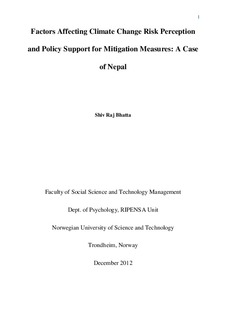Factors Affecting Climate Change Risk Perception and Policy Support for Mitigation Measures: A Case of Nepal
Abstract
Environmental psychology can made significant contribution in understanding climate-risk mitigation behaviors for reducing its adverse impacts, especially in a country highly vulnerable to climate change like Nepal. Individual level analysis to explore what motivate people to support mitigation policies is important for policy consideration. In this study, public perceptions of risk of climate change is assessed and its impacts on public support for risk-mitigation policies in Nepal is examined along with other influential factors like knowledge, trust, experiences and perceived risk of climate-related hazards –flooding and landslides. Data was collected during April-June, 2012 (n =356) using survey questionnaire among university/college students from Kathmandu Valley. Finding suggests that people who supported mitigations policies perceived higher risk of climate change, showed greater causal knowledge, imposed higher trust on the leadership of environmentalists and academician, and acknowledged landslides as posing higher risk. Participants were unable to connect climate-risk with the risk of flooding. Additionally, public supports for most effective and costly policies: carbon-focused and engineering alternatives (than general green policies) are better predicted by perceived risk of climate change, causal knowledge and trust. Finally, the thesis is concluded as assessing and acknowledging the public images of climate change is crucial for higher public support and involvement in the risk mitigation measures which would ultimately lead to success of any attempts for increasing people’s behavioral responses to mitigate the adverse impacts of climate change in Nepal.
